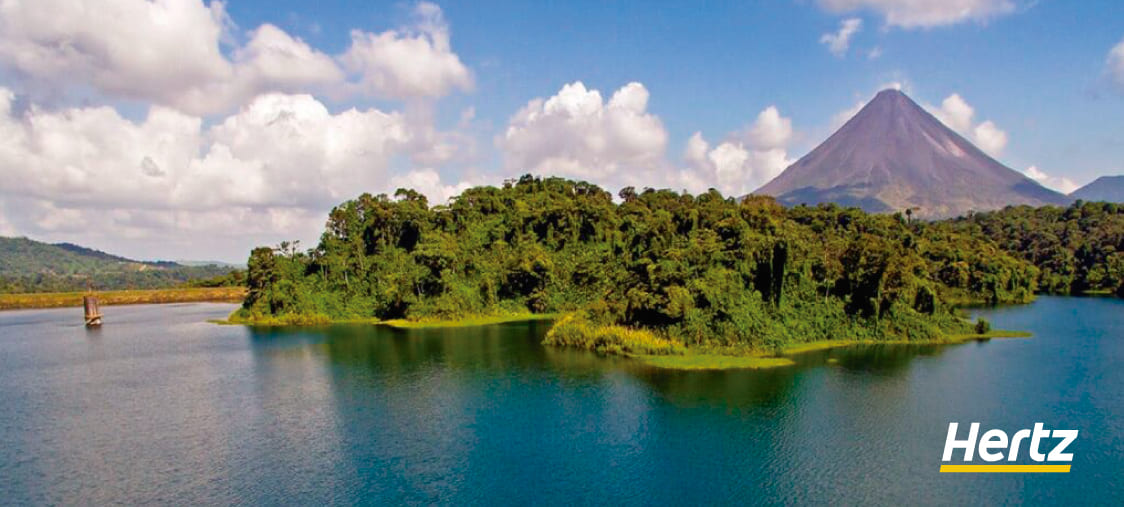
Costa Rica is a world-renowned tourist destination known for its unique biodiversity and beautiful natural landscapes. From pristine beaches to lush tropical forests, the country offers an unforgettable experience for those looking to connect with nature. However, as responsible travelers, it’s essential for every visitor to respect the regulations set in place to protect these valuable ecosystems.
At Hertz Rent a Car, we understand that many of our customers wish to explore the country's most iconic areas, such as national parks, biological reserves, and wildlife zones. To ensure that your visit is not only safe and enjoyable but also environmentally respectful, we offer you a guide to the main regulations to follow when visiting these protected areas.
In natural areas, waste can have a negative impact on the environment. It is crucial that all tourists cooperate by properly disposing of their solid waste, separating it and placing it in the designated bins. Let's work together to keep Costa Rica clean and free of pollution.
When visiting any protected area, remember you are entering a space that must be respected. Your visit should be carried out with a conservationist mindset, always with an attitude of protecting the environment. This is not just a gesture of respect for nature, but also for wildlife, which must be defended and, if necessary, rescued.
To prevent the risk of forest fires and ensure the safety of all, smoking is prohibited in natural areas. This rule applies not only to tourists but also to guides and drivers. Smoking can endanger delicate ecosystems and the habitats of endemic species.
We recommend not bringing food into natural areas. This measure is designed to avoid attracting wildlife to human food, which can disturb their habits and cause long-term harm. Additionally, human food is not suitable for local fauna and could harm their health.
Make sure you do not disturb wildlife in its natural environment. This includes avoiding excessive noise, maintaining a safe distance from species, and refraining from touching plants. Your presence should be as non-invasive as possible to ensure that animals and plants continue to thrive without interference.
It is important to respect boundaries and always walk within the marked trails. This not only helps protect the ecosystem but also ensures your safety. Additionally, staying on designated paths helps preserve the natural habitats of plants and animals.
Never feed wild animals. While it may be tempting to offer them food, such interactions can alter their behavior and lead them to rely on humans. Leaving food scraps outside of designated areas is also prohibited.
If you encounter other tourist groups on a trail, maintain a respectful distance to avoid causing excessive disturbance to the environment. Too much activity or noise can upset the balance of the ecosystem, so be considerate of other visitors and nature.
The tourist zones near protected areas are not only attractive because of their natural beauty but also their cultural richness. Support local communities by purchasing goods and services directly from the area. This helps promote economic development and fosters a positive relationship between residents and conservation efforts.
It is important to remember that, according to Wildlife Conservation Law #7495, it is illegal to acquire, trade, or possess products made from wild species, endangered woods, or the species themselves. This law must be strictly followed, and violations can result in severe penalties.
Costa Rica is committed to defending the rights of children and adolescents. If you witness any situation suggesting the exploitation of minors for sexual purposes, we urge you to report it immediately. This activity is severely penalized in the country, with prison sentences starting at 8 years, with no possibility of bail. Responsible tourism also involves protecting the most vulnerable.
Keep in mind that Costa Rica has strict laws against the use of illegal substances (Law #8204) and sexual harassment (Law #7476). These laws are designed to ensure a safe and respectful environment for all, and they must be followed at all times.
Costa Rica is a destination that offers the opportunity to enjoy its stunning biodiversity, but also the responsibility to preserve it. By following these regulations and adopting responsible tourism practices, you will not only have a memorable trip but also contribute to the conservation of our beautiful country. From Hertz Rent a Car, we invite you to explore Costa Rica in a respectful way, taking care of both the natural environment and the communities that call it home.
For more information on regulations and protected areas, we suggest visiting the National System of Conservation Areas (SINAC) website: www.sinac.go.cr.
Enjoy your adventure in Costa Rica and help us preserve this paradise for future generations!
COSTA RICA:
+506 4036-7400
USA & CANADÁ (Toll Free)
833-888- 8722